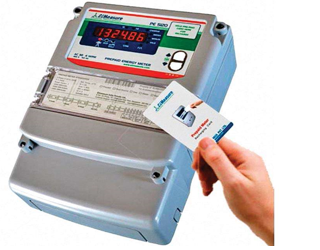INP-WealthPk
Amir Saeed

Prepaid meters provide a viable way forward for the country’s energy sector to address revenue loss and inaccurate billing, potentially saving billions of rupees and enhancing consumer satisfaction and accountability. Talking to WealthPK, Dr Naveed Arshad, a LUMS Energy Institute (LEI) member, highlighted that prepaid meters work similarly to a mobile phone credit system in that they let consumers pay in advance. “This allows consumers to regulate their energy usage and ensures energy consumption can be monitored in real time.” “Electricity companies can drastically lower non-payment risk by switching to a prepaid system, where consumers can only use the power they have already paid for. This model would help the power sector maintain financial stability and develop an environment of prudent consumption.” Arshad further highlighted that the most significant advantage of prepaid meters was its ability to enhance billing accuracy. “Billing disputes are a regular source of frustration for both companies and consumers.”
He pointed out that with prepaid systems, readings are taken automatically and accurately, eliminating human error and the potential for manipulation. “This transparency builds trust between consumers and service providers and ensures that the actual consumption data is used for better grid management and planning.” “Furthermore, energy theft, a major problem in the country’s power distribution system, can be substantially reduced with prepaid meters. By leveraging cutting-edge technology, these meters would identify and report irregularities in usage patterns, assisting authorities in locating and addressing theft incidents.” “By curbing this prevalent malpractice, the government can recover significant lost revenue, which could then be reinvested into infrastructure and service improvements,” he suggested. Talking to WealthPK, Ubaidur Rehman Zia, Head of Energy Unit, Sustainable Development Policy Institute (SDPI), said that the installation of prepaid meters would have financial ramifications that extend beyond just recovering financial losses.
“Companies can improve service quality and increase access to energy by shifting the savings from reduced operational costs associated with billing and collection.” He pointed out that many regions still lack reliable power supply, and such investments could make significant improvements in the quality of life for millions of citizens. He highlighted that the installation of prepaid meters is not without challenges, though. “The initial cost of installation and the need for robust technological infrastructure would pose significant challenges. Additionally, there is a need for information to ensure that users understand how to effectively manage their prepaid accounts.” However, he said despite the initial challenges, the long-term benefits outweigh them, highlighting the need for collaboration between the government and the energy sector stakeholders on a comprehensive installation plan.
Credit: INP-WealthPk





